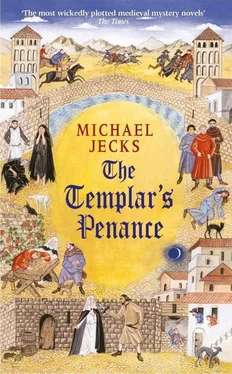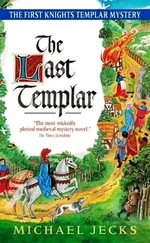Michael Jecks - The Templar
Здесь есть возможность читать онлайн «Michael Jecks - The Templar» весь текст электронной книги совершенно бесплатно (целиком полную версию без сокращений). В некоторых случаях можно слушать аудио, скачать через торрент в формате fb2 и присутствует краткое содержание. Год выпуска: 2014, ISBN: 2014, Издательство: Headline, Жанр: Исторический детектив, на английском языке. Описание произведения, (предисловие) а так же отзывы посетителей доступны на портале библиотеки ЛибКат.
- Название:The Templar
- Автор:
- Издательство:Headline
- Жанр:
- Год:2014
- ISBN:9781472219763
- Рейтинг книги:4 / 5. Голосов: 1
-
Избранное:Добавить в избранное
- Отзывы:
-
Ваша оценка:
- 80
- 1
- 2
- 3
- 4
- 5
The Templar: краткое содержание, описание и аннотация
Предлагаем к чтению аннотацию, описание, краткое содержание или предисловие (зависит от того, что написал сам автор книги «The Templar»). Если вы не нашли необходимую информацию о книге — напишите в комментариях, мы постараемся отыскать её.
The Templar — читать онлайн бесплатно полную книгу (весь текст) целиком
Ниже представлен текст книги, разбитый по страницам. Система сохранения места последней прочитанной страницы, позволяет с удобством читать онлайн бесплатно книгу «The Templar», без необходимости каждый раз заново искать на чём Вы остановились. Поставьте закладку, и сможете в любой момент перейти на страницу, на которой закончили чтение.
Интервал:
Закладка:
They had been waiting here as he had told them, and now that the little cavalcade was done and the body had been carried away by Frey Ramon, they all felt the anti-climax. They turned to drinking more cider or wine, thinking about finding some food and maybe a woman. One of his men had told of a serving girl at an inn up the way who had a saucy smile that promised more than mere conversation, or he was a mudejar !
Domingo sat on a wall with a pot of wine and drank steadily.
This place was too far from home. He’d never have come here if it wasn’t for that bitch of a Prioress. She’d tempted him with money, him and his men. She needed protection, she said. And Joana had added her voice to the Prioress’s. She told her cousin that she needed his help: without some sort of guard, there was no telling what might happen to Dona Stefania and her. They were carrying something, she hinted, something which was so valuable, they must have men about them to guard it.
It was enough to pique his interest, naturally. Joana knew perfectly well how her cousin made his living; Domingo captured travellers and held them hostage, sometimes wounding them if their families were too slow to pay, occasionally killing them when the whim took him.
His son, poor Sancho, he was a good lad. Not the cleverest, even Domingo wouldn’t suggest that, but he was tough, ruthless and loyal, provided you didn’t take your eyes off him. If you did, you might learn just how ruthlessly ambitious he was. Not the sort of man you would let behind you.
But he was Domingo’s son, and to Domingo a blood tie between man and son was sacred. His duty to find and kill his son’s murderer was equally sacred.
The attack was strange. He still wasn’t sure why the Prioress had instructed them to attack the pilgrims. It was days since she had tried to join the band, days since she had opened her legs to the shabby little creep in the shed. Oh, Domingo knew all about that. He’d seen the churl go in there with the Dona, saw the tall knight walk in and hurriedly leave; later he’d seen the Prioress slip out, walking a little more bandy-legged than she had for a while, and with a huge, grateful smile on her face. But any shame or anger she felt at her subsequent treatment must have faded by the time she told Joana to have Domingo attack the pilgrims.
‘Attack them and kill all,’ Joana had said.
‘Why?’
‘She wills it.’
That was all. Joana had swept around in her nice new blue tunic as though she was going to flounce from his fireside, but Domingo wasn’t so easy to impress. He grabbed her arm and pulled her easily to him, bending her arm behind her back. ‘ Why , I asked.’
There was a prick at his belly, and he glanced down to see that in her other hand she gripped a short knife. ‘Let me go!’ she said through gritted teeth.
‘You’d not kill a chicken with that,’ he said, and then his hand moved. He took the blade in his open hand and twisted. Her face was wrenched with pain as he tightened his grip, squeezing her fingers tightly into the wood. He could feel the blade cutting into the fatty skin at the edge of his palm, but his expression didn’t alter. Pain was something he was used to. ‘Well?’
‘A man has threatened her with blackmail.’
He released her with a feeling of anti-climax. Blackmail was a good way to earn money, he knew. He wondered what scandalous thing it was, that she was paying to keep quiet. If he could learn it, it might benefit him. However, he did think that it was unnecessary to kill all the others just because the Dona wanted one man dead. Not that it mattered.
But now it did matter. It mattered a great deal, because his own boy was dead. Poor Sancho; it was terrible to think that he’d never be able to rely on the lad at his side in a fight. Sancho was dead and gone for ever.
The thought brought a huge gobbet of grief into Domingo’s breast. To lose it, he stood and sniffed, gazing about him like a man idly stretching. He could feel the tension in his men, as though they knew what he was going through and feared that he might explode into violence. They had seen his rages before. Curiously, he felt no need. For once in his life, fighting would not assuage his spirit. It couldn’t.
In the square, he could see the men discussing the dead woman in the blue dress. It was nothing to him. Others mattered not at all, compared with poor Sancho. When they returned to their little church in their home town, Domingo would have to make an offering in Sancho’s memory. Their town was poor, but at least the priest was on the side of the poverty-struck peasants. They had little enough to look forward to, as he knew — only the annual cycle of labour on the land, unless they could break out like Domingo and find work elsewhere, making use of their physical strength in the service of whichever lord or lady offered the most money.
That was when he saw him, over at the far side of the square, peering down at the body with a clinical interest.
It was the fair one, the tall, easy-looking bastard. He was with the other, the one who’d ridden into the fight with two blades flashing; while the fair one killed Sancho, the other one had slaughtered others. Domingo’s son Sancho was killed as he struck down a pilgrim, and then the fair man rode over his poor body, trampling it in the dirt like the carcass of a dead fox. As though there was nothing to worry about, killing a man like that. There was nothing but shame in leaving a man alive who could behave in such a manner towards Domingo’s kin. This was a deed that could only be punished with blood, with the man’s blood.
Dropping the cup and letting it shatter on the stone floor, Domingo stood up straight, twisting his head as he contemplated the bastard. He thought he was powerful, Domingo saw; thought he was superior to all others, probably. Well, Domingo would prove him wrong. He would cut out the man’s heart and eat it. He’d open his belly and throttle him with his own bowels. He’d …
‘Domingo? What is it?’ One of his men was watching him warily.
‘Him — the fair one. He’s the man who killed Sancho.’
‘You are sure?’
Domingo barely glanced at him, but reached out with the speed of a striking snake, took hold of Azo’s shirt and pulled. The other was a thin, unhealthy-looking youth of nearly twenty, his face a mass of acne, and he looked terrified as Domingo held him close enough to see the sweat of fear starting from his forehead. ‘Yes,’ he hissed. ‘I am sure. I watched him slaughter my son like a pig. You think I would forget his face?’
‘We can do nothing here in the city,’ another man cautioned. ‘If we do, we’ll be found.’
‘I want his head. The man killed my boy. I want him to pay.’
Azo felt himself being released and stood back, watching as Domingo touched his old wooden-handled dagger. ‘They were fearsome fighters,’ he said hesitantly.
Domingo sneered at him, then hawked and spat at his feet. ‘So am I!’ he snarled as he walked out and followed after the fair man. However, when he reached the square, the tall figure had disappeared. He took one alley at random, hurrying up it and staring about him, but although he followed it to the old city’s wall, he saw neither hide nor hair of his quarry.
Feeling the hilt of his dagger, Domingo licked lips which were dry with expectation and swore softly.
‘I shall find you, murderer of my Sancho. On his grave, I swear I shall find you, and cut you to pieces!’
Simon felt torn as he watched the grieving figure of Ramon walk slowly through the crowds, carrying his murdered fiancee to the Cathedral. Even when he was lost to view, the moving of heads showed where he was. ‘Baldwin, we have to ask him what’s happened here,’ he said quickly. ‘Perhaps he knows of someone who was obsessed with his fiancee and might be guilty of this crime.’
Читать дальшеИнтервал:
Закладка:
Похожие книги на «The Templar»
Представляем Вашему вниманию похожие книги на «The Templar» списком для выбора. Мы отобрали схожую по названию и смыслу литературу в надежде предоставить читателям больше вариантов отыскать новые, интересные, ещё непрочитанные произведения.
Обсуждение, отзывы о книге «The Templar» и просто собственные мнения читателей. Оставьте ваши комментарии, напишите, что Вы думаете о произведении, его смысле или главных героях. Укажите что конкретно понравилось, а что нет, и почему Вы так считаете.












